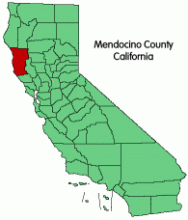Mendocino County Worried About Their Copper During IP Transition
This is not our first look at problems with communications service in rural Mendocino County, California, but we continue to see concerning stories coming from it. The tenuous situation along the North Coast, where large private providers have refused to invest in redundant networks, is heightening concern among first responders, community leaders, and citizens.
The problem stems from the tendency of incumbents to neglect existing copper systems that need to be replaced with fiber based VoIP. Randy MacDonald, assistant fire chief of the Camptche Volunteer For Department of rural Mendocino County recently presented the department's concerns to congressional and regulatory staff in D.C. The Press Democrat quoted him in a recent article that examines the issue in their region:
“We’ve built a second-to-none 911 system,” MacDonald said. But “we’re almost by default allowing it to become degraded as technology changes.”
For decades, people have been paying bills with an expectation that they were helping to maintain the network. Uncle Sam has spent billions subsidizing carriers to ensure the network worked. But now it seems that some carriers are preparing to harvest as much as they can without delivering reliable communications to those paying the bills:
Verizon’s biggest union, the Communication Workers of America, has accused the company of refusing to fix broken copper lines and pushing customers to move to fiber or wireless systems. Verizon has flatly denied the charges.
Some, like MacDonald, believe other telecommunications corporations are attempting to abandon their copper systems through neglect.
“There is a lot of concern the telecom giants are basically allowing the copper infrastructure to just deteriorate,” Mendocino County Supervisor John McCowen said.
The FCC knows that there is growing concern over the attitude of the incumbents. In order to address some of these problems in Mendocino and similar rural areas as we trade in copper for glass, in August the FCC adopted a number of rules for carriers:


